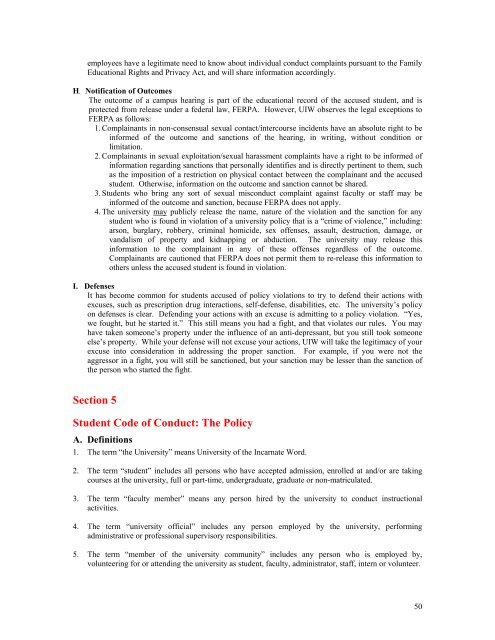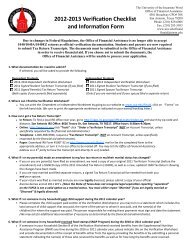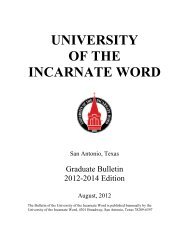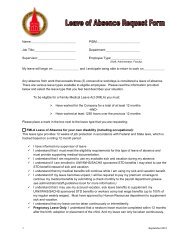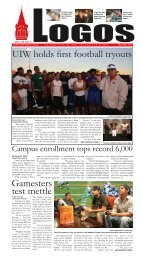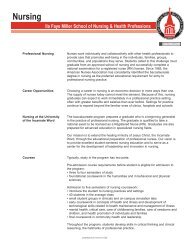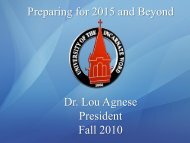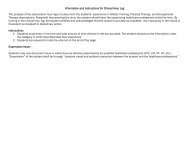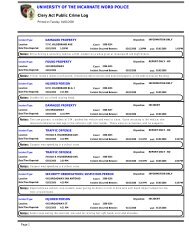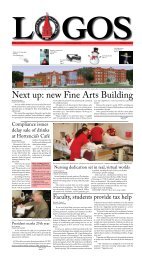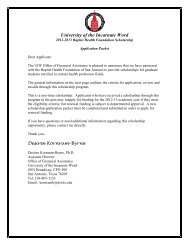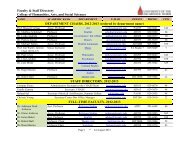2006-2007 Student Handbook - University of the Incarnate Word
2006-2007 Student Handbook - University of the Incarnate Word
2006-2007 Student Handbook - University of the Incarnate Word
You also want an ePaper? Increase the reach of your titles
YUMPU automatically turns print PDFs into web optimized ePapers that Google loves.
employees have a legitimate need to know about individual conduct complaints pursuant to <strong>the</strong> FamilyEducational Rights and Privacy Act, and will share information accordingly.H. Notification <strong>of</strong> OutcomesThe outcome <strong>of</strong> a campus hearing is part <strong>of</strong> <strong>the</strong> educational record <strong>of</strong> <strong>the</strong> accused student, and isprotected from release under a federal law, FERPA. However, UIW observes <strong>the</strong> legal exceptions toFERPA as follows:1. Complainants in non-consensual sexual contact/intercourse incidents have an absolute right to beinformed <strong>of</strong> <strong>the</strong> outcome and sanctions <strong>of</strong> <strong>the</strong> hearing, in writing, without condition orlimitation.2. Complainants in sexual exploitation/sexual harassment complaints have a right to be informed <strong>of</strong>information regarding sanctions that personally identifies and is directly pertinent to <strong>the</strong>m, suchas <strong>the</strong> imposition <strong>of</strong> a restriction on physical contact between <strong>the</strong> complainant and <strong>the</strong> accusedstudent. O<strong>the</strong>rwise, information on <strong>the</strong> outcome and sanction cannot be shared.3. <strong>Student</strong>s who bring any sort <strong>of</strong> sexual misconduct complaint against faculty or staff may beinformed <strong>of</strong> <strong>the</strong> outcome and sanction, because FERPA does not apply.4. The university may publicly release <strong>the</strong> name, nature <strong>of</strong> <strong>the</strong> violation and <strong>the</strong> sanction for anystudent who is found in violation <strong>of</strong> a university policy that is a “crime <strong>of</strong> violence,” including:arson, burglary, robbery, criminal homicide, sex <strong>of</strong>fenses, assault, destruction, damage, orvandalism <strong>of</strong> property and kidnapping or abduction. The university may release thisinformation to <strong>the</strong> complainant in any <strong>of</strong> <strong>the</strong>se <strong>of</strong>fenses regardless <strong>of</strong> <strong>the</strong> outcome.Complainants are cautioned that FERPA does not permit <strong>the</strong>m to re-release this information too<strong>the</strong>rs unless <strong>the</strong> accused student is found in violation.I. DefensesIt has become common for students accused <strong>of</strong> policy violations to try to defend <strong>the</strong>ir actions wi<strong>the</strong>xcuses, such as prescription drug interactions, self-defense, disabilities, etc. The university’s policyon defenses is clear. Defending your actions with an excuse is admitting to a policy violation. “Yes,we fought, but he started it.” This still means you had a fight, and that violates our rules. You mayhave taken someone’s property under <strong>the</strong> influence <strong>of</strong> an anti-depressant, but you still took someoneelse’s property. While your defense will not excuse your actions, UIW will take <strong>the</strong> legitimacy <strong>of</strong> yourexcuse into consideration in addressing <strong>the</strong> proper sanction. For example, if you were not <strong>the</strong>aggressor in a fight, you will still be sanctioned, but your sanction may be lesser than <strong>the</strong> sanction <strong>of</strong><strong>the</strong> person who started <strong>the</strong> fight.Section 5<strong>Student</strong> Code <strong>of</strong> Conduct: The PolicyA. Definitions1. The term “<strong>the</strong> <strong>University</strong>” means <strong>University</strong> <strong>of</strong> <strong>the</strong> <strong>Incarnate</strong> <strong>Word</strong>.2. The term “student” includes all persons who have accepted admission, enrolled at and/or are takingcourses at <strong>the</strong> university, full or part-time, undergraduate, graduate or non-matriculated.3. The term “faculty member” means any person hired by <strong>the</strong> university to conduct instructionalactivities.4. The term “university <strong>of</strong>ficial” includes any person employed by <strong>the</strong> university, performingadministrative or pr<strong>of</strong>essional supervisory responsibilities.5. The term “member <strong>of</strong> <strong>the</strong> university community” includes any person who is employed by,volunteering for or attending <strong>the</strong> university as student, faculty, administrator, staff, intern or volunteer.50


